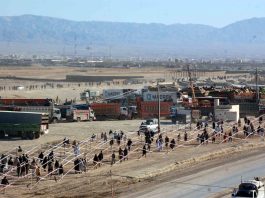Peshawar: In Pakistan’s desperately under-developed tribal areas, teenage dreams of futures as engineers and doctors are being thwarted because of a dearth of school teachers and basic teaching facilities, school students, parents and teachers say.
“It is my long-standing desire to become a medical practitioner to serve my community’s patients free of cost,” Abid Jan, a year 7 student at a government-run school in South Waziristan, told News Lens Pakistan.
He said he often gets to school late because of the lack of transport from his home to school.
“It hurts me when I compare my school to those of down districts’ schools’ facilities,” he added.
Jahan Zeb, a teacher at a primary school in South Waziristan, said his school is in dire need of qualified teachers, clean drinking water, toilets, a playground and proper transport.
FATA education officials and tribal elders say delay by the Ministry of Finance in approving 2,362 teachers’ positions in the volatile tribal region will deal a blow to efforts aimed at beating militant tendencies in the region.
Last decade, most uneducated youth of the region joined militants’ ranks, tribal elder Malik Noor Nawaz recalls.
“Steps should be taken to improve education here. Otherwise, militancy can not be defeated through the use of force alone,” Nawaz told News Lens.
Khan Malik, the president of the All FATA Teachers Association (FTA), said a number of state-of-the-art buildings for educational institutions have been built in tribal areas since 2007. The FATA education directorate has sought to recruit teachers to fill the modern buildings.
“Education is the panacea to all our problems. If you really want to make extremism go away, and if you really want to develop the region, then you need to bolster the literacy rate,” Malik said.
Teacher Naseema Bibi, an Assistant Agency Education Officer in South Waziristan, said the education sector across FATA is facing daunting challenges.
“Most of the education institutions have no residential facility for teachers, they lack qualified teaching staff, and they are without drinking water. These are some of the problems which need an urgent solution,” she added.
According to Community Appraisal and Motivation Programme (CAMP), a non-governmental organization which striving for peace and development, as per the Census report of 1998, the total population of FATA is 3.17 million. The locals estimate the population to be around 7 million. Internal displacement was at its peak in 2009 when 3 million people were displaced, most of who had fled military operations in Khyber Pakhtunkhwa province and FATA.
Back in 2016, Pakistan’s military announced that most parts of the tribal belt had been purged of militants. It said the process to bring home Internally Displaced Persons (IDPs) would be completed by the end of 2016.
The Federally Administered Tribal Area (FATA)— largely known as tribal belt— saw mayhem and turmoil following violent battles between security forces and Taliban over seven years.
Ali Shah, a 10thgrade student at a government school in Wana, has ambitions of becoming an engineer to serve his community and country.
“I want to rebuild my war-ravaged home town,” he told News Lens by telephone. “But I fear I will not be able to get any higher education in this situation.”
According to documents reviewed by News Lens Pakistan, the FATA education directorate has sought approval of 2,082 teaching cadres’ posts for high, middle and primary schools and another 280 posts for the newly established Cadet Colleges of the area.
“Billions of rupees have been spent to construct buildings for educational institutions. But those facilities now present a deserted look and are on the verge of collapse,” Malik rued.
At least 80,000 Pakistanis (security forces, civilians and insurgents) were killed during the last decade in violence across Pakistan, according to the Physicians for Social Responsibility (PSR) Body Count.
Tribal elder Ameer Muhammad has two sons at a government-run school in Wana. They have complained that their school has no science laboratory and not enough teachers.
“We have neither factories nor other businesses here where our kids can work as an alternative if they are left uneducated,” the elder told News Lens.
“The government should take serious note of the deficiency in teacher numbers. Otherwise, the lack of schooling will only strengthen the hands of anti-social elements.”
Hashim Khan Afridi, director education FATA, says his department is struggling to make the new educational institutions functional due to the lack of teachers.
“We can make 700 schools functional in FATA if we get approval for the required vacancies,” he told News Lens.
The latest survey conducted by FATA Secretariat and the Bureau of Statistics shows the overall literacy rate in FATA is 33.3 per cent, far below the national average of 58 per cent as estimated in 2013-14.
Similarly, the adult literacy rate in FATA is 28.4 per cent, while the national average is 57 per cent. There is a marked gender gap in literacy. Male adult literacy rate in FATA is 45 per cent. The rate of literacy among women in FATA is a shocking 7.8 per cent.
The first ever girls’ college in South Waziristan is spacious, but it has no teachers, Afridi said.
“An enhanced education ratio among locals would discourage the trend of militancy in the long-run,” Afridi stated.
For fiscal year 2014-15, the finance division of the Ministry of Finance had approved 335 teaching posts of the required 386 vacancies, Muzaffar Burki, deputy financial adviser in the Ministry of Finance, said.
The central government has been levying unnecessary objections to the education department’s request, teachers’ association president Malik added.
Ibrash Pasha, an educationist and social activist, said FATA has been badly affected by the militancy.
“It is unfortunate that Millennium Development Goals (MDG) or Education for All targets cannot be achieved in FATA,” Pasha remarked.
The private education sector will not be willing to come to FATA at a time when the government cannot make educational institutions functional, he added.
Afridi said his directorate is working diligently to promote an even education ratio among boys and girls.
“We have already launched enrolment campaign to get 200,000 children of five years of age enrolled in schools, which got remarkable success,” he said.
The first phase of that enrolment campaign ended in May 2016, achieving a 60 per cent target. The second phase of that drive will be launched in September 2017, he said.
Ehsanullah Khan, a bureaucrat from FATA who has worked for the last three years to promote education in the tribal region, said education was the sector worst hit during the years of turmoil in the region.
“The education sector has been totally damaged in FATA. The army has established cadet colleges and Army Public Schools (APS), but intervention by the government in education sector is pathetic,” Khan said.



